Migration Forum in Southeast Europe Seeks European Solutions
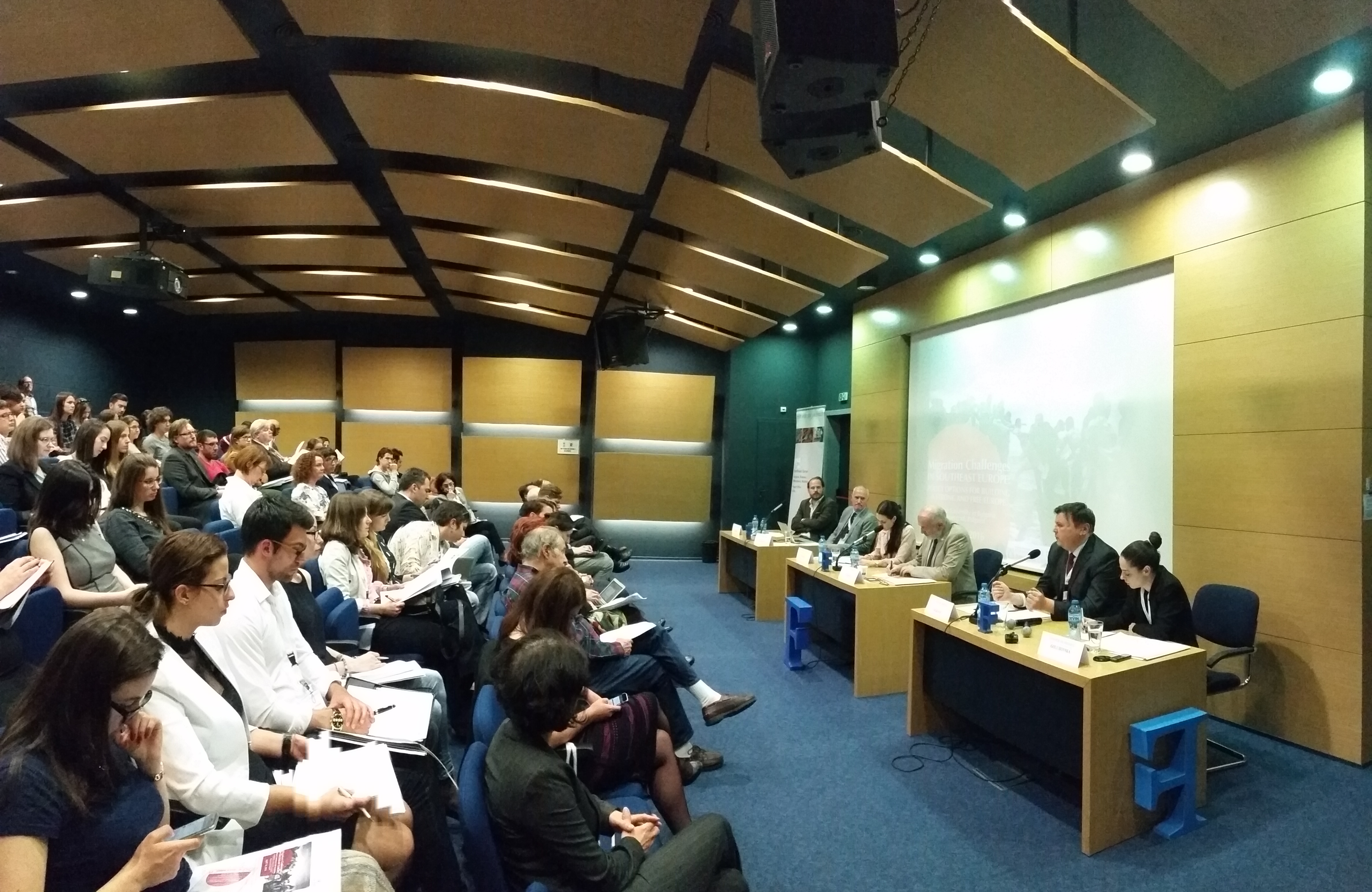
The voice of Southeast Europe has to be heard when formulating a European approach towards the current unprecedented migration flow because this region has much to offer. Geographically located on a crossroads between continents and through history marked by intense population movements, the culturally and religiously diverse Southeast is now prepared to provide common European policy options to help both national and European stakeholders in light of the greatest migration challenge in the continent`s recent history.
Watch a teaser video below:
Over a hundred policy makers, politicians, academics, journalists, and activists gathered in Blagoevgrad, on 7th and 8th April 2016, to participate in an international conference on migration. The event was the first of its kind in Bulgaria. The aim was to develop liberal-democratic responses to what Dr Rainer Adam, Regional Director of the Friedrich Naumann Foundation East and Southeast Europe, called in his welcoming remarks “the topic keeping Europe on its toes”. The conference, titled “Migration Challenges in Southeast Europe: Policy Options for Building a Strong and Free Europe”, was organised by the Regional Office for East and Southeast Europe (FNF), in close collaboration with the American University in Bulgaria (AUBG), the Centre for Legal Aid – Voice in Bulgaria, and the Refugee Support Group, with the purpose of creating a framework of concrete policy recommendations for policy-makers on the European and regional levels.
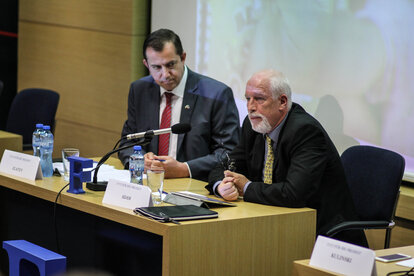
Ognian Zlatev, Head of the European Commission Representation in Bulgaria and Dr Rainer Adam, Regional Director of FNF East and Southeast Europe
Security and migration after the closure of the Western Balkans Route:
According to Ognyan Zlatev, Head of the European Commission Representation in Bulgaria, Europe faces two overlapping but distinct crises: a crisis of security and a crisis of migration. Thus, there is a need to find a solution that respects both the borders and our values in regards to various people’s search for better lives. The EU-Turkey refugee deal is the current best EU response, since it closes the irregular migration route while opening safe and legal channels for refugees to enter and seek shelter.
Watch the conference highlights here:
Migration Challenges in Southeast Europe: Policy Options for Building a Stronger Europe
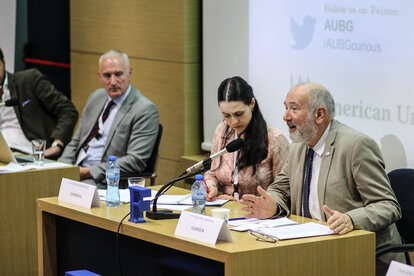
Countries of Mass Transition – the “Western Balkans Route”
The closure of the Western Blanks route is, however, another challenge for the common European approach. Due to the political and institutional shortcomings, the Western Balkan countries could not handle the migrant influx and therefore closed their borders, hoping that would lead to stronger EU involvement and regional cooperation, concluded Zoran Blazekovic, from the Croatian People`s Party, Dusan Gamser, representative of the Liberal Democratic Party of Serbia, and Jasmina Golubovska, from the Open Society Foundation in Macedonia, during the first discussion panel. A policy of “Admit those who need to be admitted” while tightening border security to prevent irregular migration was proposed during the same panel by Zoran Đoković, Adviser on Freedom of Movement and Human Contacts at OSCE/ ODIHR. Moreover, he argued, integration conditions must be synchronized throughout Europe to prevent the secondary migration of refugees and to ensure the best conditions for those who meet all legal requirements. At the same time, “solidarity is fundamental and measures should be imposed on countries which refuse to take in refugees,” added Nikolaus Scherak, Vice-President of the Parliamentary fraction of the Austrian NEOS Party, calling for a jointly coordinated EU resettlement approach.
Greece, Turkey, and Bulgaria addressing smuggling and trafficking:
In his opening speech on the second conference day, Yavor Siderov, a representative from the Council of Ministers of Bulgaria, called for a solution that combines “humanitarian aid, border integrity, and the interests of the European Union” with the long-term goal of maintaining stability and ensuring the security of external borders. He added that “Keeping Schengen alive,” while fulfilling our humanitarian obligations is fundamental to this. Outlining the topic of the following panel, “EU`s buffer zone”, Siderov was critical of the financial aid to Turkey, as the EU-Turkey refugee deal would not prevent but rather encourage organised human smuggling within the EU. Therefore, a focused effort to identify victims of trafficking among asylum seekers should be initiated and trustworthy collaboration undertaken to combat these negative processes, noted Kamelia Dimitrova, Acting Secretary General of the Bulgarian Commission for Combating Trafficking in Human Beings. The other two panel participants, Sandy Protogerou from the Greek Council of Refugees and Hakan Ataman from the Helsinki Citizens' Assembly in Turkey, provided insights on the refugee and migration situation in their respective countries, with both speakers expressing concerns over the integrity of the asylum procedure and respect for the human rights of the refugees, in respect to their return to Turkey and that country’s identification as a “Safe Third Country.”
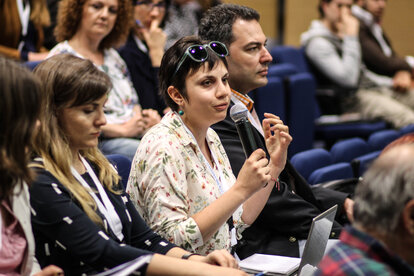
Intensive Discussions
Multiflow approach: borders, media, hate crimes, and civil society:
Four workshops on the topics: Border Management, The role of media, Hate crimes and hate speech, and Civic involvement, complemented the panel discussions during this two-day conference whose goal was to provide a practical approach to identifying concrete policy recommendations to the most pressing challenges brought by the increased migration in, and through, Southeast Europe. These working sessions were led by practitioners from Macedonia, Serbia, Bulgaria, Croatia, and Hungary. It provided a basis for the last part of the event - the adoption of a policy paper outline, moderated by Daniel Kaddik, FNF Southeast Europe Project Director. The policy paper itself will be developed further online by all the conference participants and then published as a follow-up in May 2016.
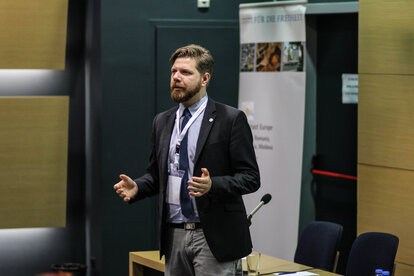
Daniel Kaddik, Project Director of FNF SEE, moderates the discussion.
Stay tuned for more information and follow-up from the conference. You can visit the event in Facebook here.
For more photos from the event: